人教新目标八年级英语上册期中考试知识点汇总
人教新目标(Go for it)版八年级上册英语期中复习—重要知识考点+练习过关(含答案)
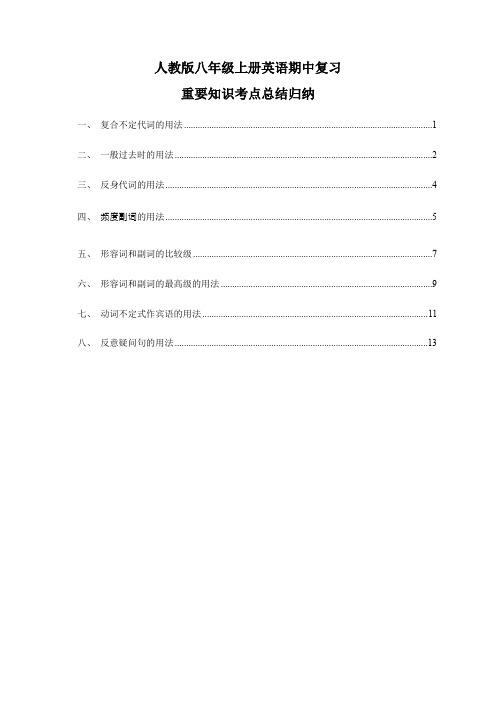
重要知识考点总结归纳一、复合不定代词的用法 (1)二、一般过去时的用法 (2)三、反身代词的用法 (4)四、频度副词的用法 (5)五、形容词和副词的比较级 (7)六、形容词和副词的最高级的用法 (9)七、动词不定式作宾语的用法 (11)八、反意疑问句的用法 (13)重要知识考点总结归纳一、复合不定代词的用法1、复合不定代词只相当于名词,在句子中可作主语、宾语、表语,不能作定语(即不具有形容词的性质)。
❶ 含-body和-one的复合不定代词只用来代替人,在功能和意义上完全相同,可以互换。
eg:Someone/Somebody is crying in the next room.有人在隔壁房间里哭。
❶ 含-thing的复合不定代词只用来指事物。
eg:Are you going to buy anything? 你打算去买东西吗?2、复合不定代词都作单数看待,如果充当主语时,谓语动词用单数形式。
eg:Is everyone here today? 今天大家都到齐了吗?Nothing is difficult if you put your heart into it.世上无难事,只怕有心人。
3、形容词修饰复合不定代词时,要放在复合不定代词的后面。
eg:Can you tell something interesting? 你能讲一些有趣的事情吗?Did you go anywhere interesting last weekend?上周末你去什么有趣的地方了4、和some,any用法一样,含有-some的复合不定代词一般用于肯定句和请求语气的句子中,含有-any的复合不定代词一般用于否定句、疑问句。
eg:I have something important to tell you. 我有一些重要的事要告诉你。
Do you have anything to say? 你有话要说吗?5、在表示请求、邀请、提建议等的疑问句和希望得到对方肯定答复的疑问句中,也可用含-some的复合不定代词。
人教版八年级上册英语期中知识点梳理
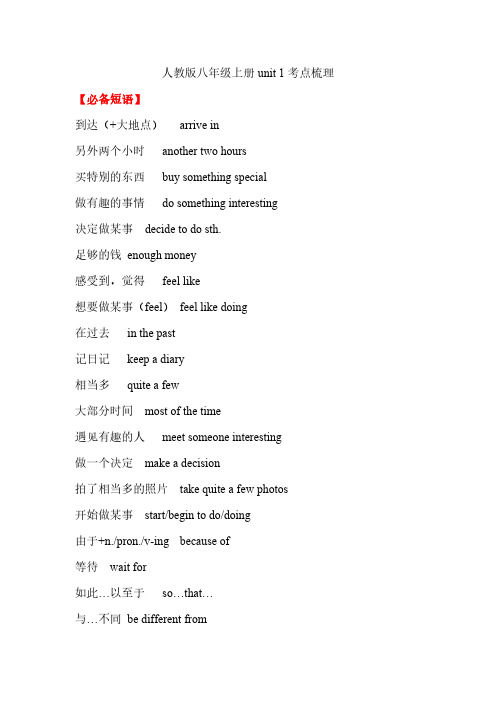
人教版八年级上册unit1考点梳理【必备短语】到达(+大地点)arrive in另外两个小时another two hours买特别的东西buy something special做有趣的事情do something interesting决定做某事decide to do sth.足够的钱enough money感受到,觉得feel like想要做某事(feel)feel like doing在过去in the past记日记keep a diary相当多quite a few大部分时间most of the time遇见有趣的人meet someone interesting做一个决定make a decision拍了相当多的照片take quite a few photos开始做某事start/begin to do/doing由于+n./pron./v-ing because of等待wait for如此…以至于so…that…与…不同be different from与…相同the same as尽力做某事try to do sth尝试做某事try doing sth尽某人最大努力做try one’s best to do sth.【教材考点梳理】【1】...go with anyone?(P.2)(1)anyone用作不定代词,意为“有人、任何人”,相当于anybody,用于疑问句和否定句中,在肯定句中用someone或者somebody。
但是anyone也可以用在肯定句中,表示“任何一个人”。
例句:Did you meet anyone friendly in that city?例句:Anyone can be helpful in some way.(2)anyone只能指人,不可以指物,后面不接of短语;(3)any one既可以指人也可以指物,后可接of短语。
例句:You can ask any one of us about this question.【2】Well,but the next day was not as good.(P.5)当我们要表示双方某方面(如年龄、身高等)程度相同或不同时,常用as…as或not as…as结构,表示“和……一样”或“和……不一样”。
人教新目标版八年级英语上册期中复习资料Unit4
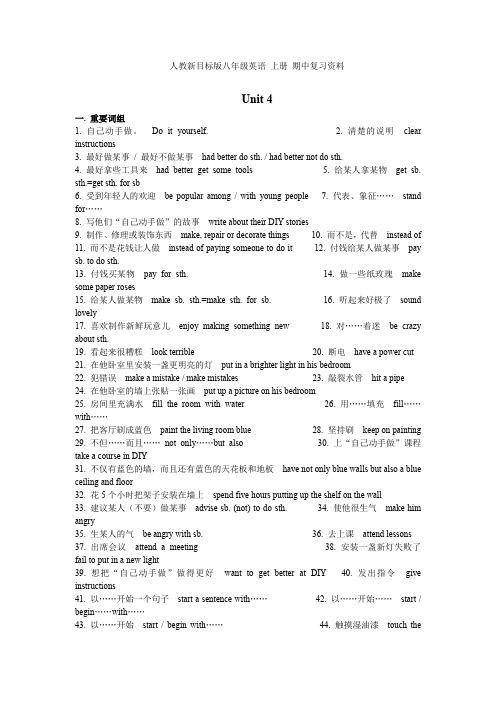
人教新目标版八年级英语上册期中复习资料Unit 4一.重要词组1. 自己动手做。
Do it yourself.2. 清楚的说明clear instructions3. 最好做某事/ 最好不做某事had better do sth. / had better not do sth.4. 最好拿些工具来had better get some tools5. 给某人拿某物get sb. sth.=get sth. for sb6. 受到年轻人的欢迎be popular among / with young people7. 代表、象征……stand for……8. 写他们“自己动手做”的故事write about their DIY stories9. 制作、修理或装饰东西make, repair or decorate things 10. 而不是,代替instead of 11. 而不是花钱让人做instead of paying someone to do it 12. 付钱给某人做某事pay sb. to do sth.13. 付钱买某物pay for sth. 14. 做一些纸玫瑰make some paper roses15. 给某人做某物make sb. sth.=make sth. for sb. 16. 听起来好极了sound lovely17. 喜欢制作新鲜玩意儿enjoy making something new 18. 对……着迷be crazy about sth.19. 看起来很糟糕look terrible 20. 断电have a power cut21. 在他卧室里安装一盏更明亮的灯put in a brighter light in his bedroom22. 犯错误make a mistake / make mistakes 23. 敲裂水管hit a pipe24. 在他卧室的墙上张贴一张画put up a picture on his bedroom25. 房间里充满水fill the room with water 26. 用……填充fill……with……27. 把客厅刷成蓝色paint the living room blue 28. 坚持刷keep on painting 29. 不但……而且……not only……but also 30. 上“自己动手做”课程take a course in DIY31. 不仅有蓝色的墙,而且还有蓝色的天花板和地板have not only blue walls but also a blue ceiling and floor32. 花5个小时把架子安装在墙上spend five hours putting up the shelf on the wall33. 建议某人(不要)做某事advise sb. (not) to do sth. 34. 使他很生气make him angry35. 生某人的气be angry with sb. 36. 去上课attend lessons 37. 出席会议attend a meeting 38. 安装一盏新灯失败了fail to put in a new light39. 想把“自己动手做”做得更好want to get better at DIY 40. 发出指令give instructions41. 以……开始一个句子start a sentence with……42. 以……开始……start / begin……with……43. 以……开始start / begin with……44. 触摸湿油漆touch thewet paint45. 用一把剪刀剪出一张张卡片cut out pieces of card with a pair of scissors46. 在卡片的另一面on the other side of the card 47. 放弃某事give up sth.48. 把它/ 它们放弃give it / them up 49. 放弃做某事give up doing sth.50. 坚持努力keep trying 51. 上学迟到be late for school52. 了解一点点关于“自己动手做”的知识know a liitle about DIY53. 要有耐心be patient 54. 一本有用的书 a useful book55. 一本无用的词典 a useless dictionary 56. 干“自己动手做”的活do a DIY job57. 如何制作水果沙拉how to make a fruit salad 58. 把他们混合在一起mix them together59. 加一些沙拉酱add some salad cream 60. 把……切成……cut……into……61. 把一些大一点的水果切成小块cut some of the larger fruit into small pieces62. 确保make sure 63. 看起来和它尝起来一样好look as good as it tastes64. 把它留在空气中一段时间leave it in the air for some time 65. 例如for example 66. 另外一片面包another piece of bread 67. 进行户外运动do outdoor sports68. 整天呆在家里stay at home all day 69. 我们的隔壁邻居our neighbour next door70. 遍布整个地板all over the floor 71. 收拾妥,整理好tidy up72. 把它/ 它们整理好tidy it / them up 73. 立刻,马上right now=right away=at once74. 决定做某事decide to do sth. 75. 决定不做某事decide not to do sth.76. 做一张上面有玫瑰花的卡片make a card with some roses on it77. 合作得很愉快have fun working together 78. 把玫瑰红涂成红色colour / paint the roses red79. 把它粘贴在封面上stick it on the cover 80. 用旧衣服制成东西make things from old clothes二. 重要句型1. Here are clear instructions. Read them first. 这儿有清楚的说明,先看看吧。
人教版八年级上册英语期中复习:重点单词+重点短语+重点句型+情景交际+作文范文

人教版八年级上册英语期中复习:重点单词+重点短语+重点句型+情景交际+作文范文重点单词知识梳理:一、单词领读percent n. 百分之……point n. 得分;点mind n. 头脑;心智break v. (使)破;裂;碎;损坏writer n. 作者;作家laugh v. 笑;发笑n. 笑声almost adv. 几乎;差不多二、重点单词【单词复习】1. percent n. 百分之……【用法】也可写作per cent。
它没有复数形式,和数字搭配使用时放在数字后面。
【例句】The boy finished 30 percent of his homework last night.这个男孩昨天晚上完成了作业的百分之三十。
【拓展】当percent作主语时,谓语动词要根据其后所接名词的单复数来判断。
【例句】Twenty percent of the students are from China in his class.他所在的班中百分之二十的学生来自中国。
【考题链接】Sixty percent of the water in the lake __________________ clean and clear.A. areB. isC. wasD. were答案:B思路分析:因为主语water为不可数名词,故谓语动词用单数形式。
句意为“这湖中百分之六十的水是干净清洁的。
”表示现在的状况,故用一般现在时,B项正确。
2. mind n.头脑;心智【用法】作名词可构成短语:change one’s mind 改变主意;make up one’s mind 下决心。
【例句】I think nothing can change his mind. 我认为没什么可以改变他的主意。
【拓展】mind可作动词,意为“介意”,其后接名词、代词或动词的-ing形式;Would you minddoing something?意为“做某事你介意吗?”。
人教版八年级上册期中复习:单元知识梳理
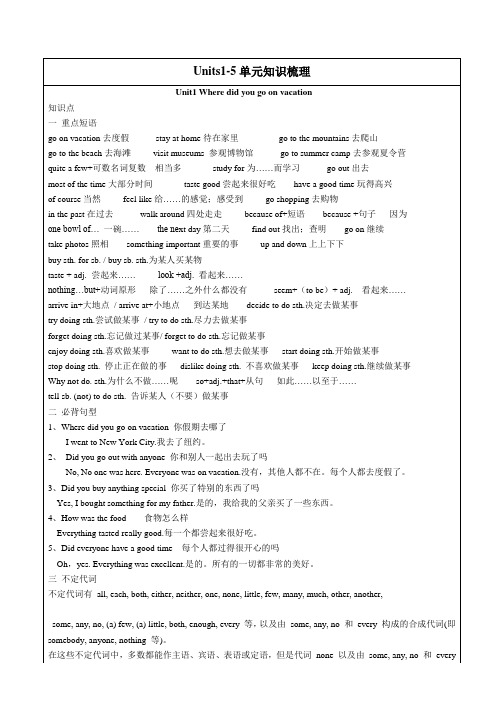
stop doing sth.停止正在做的事dislike doing sth.不喜欢做某事keep doing sth.继续做某事
Why not do. sth.为什么不做……呢so+adj.+that+从句如此……以至于……
1、复合不定代词:由some,any,no,every加上-body,-one,-thing构成的不定代词,叫做复合不定代词。
somebody = someone某人something某物,某事
anybody = anyone任何人anything什么事物,任何事物,无论什么事物
nobody = no one没有人,不重要的人nothing没有东西,什么也没有;不重要的人或事
Everything is made of elements.任何东西都是元素构成的。(作主语)
I have nothing to say toady.我今天没什么可讲的。(作宾语)
That`s nothing.没什么。(作表语)
(2)作主语时,谓语动词用单数。
(3)代替与-thing构成的复合不定代词,用it;代替与-body, -one构成的复合不定代词,一般用they,在正式文体中可用he。
十over介词,多于,超过,在…以上(表示数目、程度)= more than
My father is over 40 years old.
在…之上,与物体垂直且不接触,与under相反。There is a map over the blackboard.
超过:I hear the news over the radio.
八年级上册英语期中考知识要点人教版
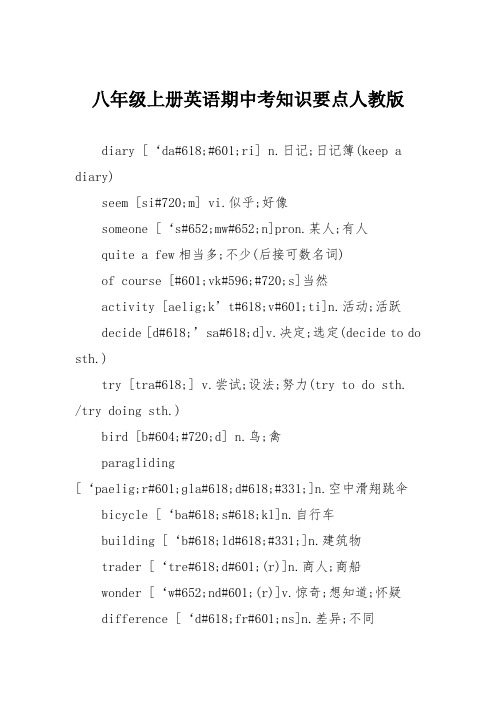
八年级上册英语期中考知识要点人教版diary [‘da#618;#601;ri] n.日记;日记簿(keep a diary)seem [si#720;m] vi.似乎;好像someone [‘s#652;mw#652;n]pron.某人;有人 quite a few相当多;不少(后接可数名词)of course [#601;vk#596;#720;s]当然activity [aelig;k’t#618;v#601;ti]n.活动;活跃 decide [d#618;’sa#618;d]v.决定;选定(decide to do sth.)try [tra#618;] v.尝试;设法;努力(try to do sth. /try doing sth.)bird [b#604;#720;d] n.鸟;禽paragliding[‘paelig;r#601;ɡla#618;d#618;#331;]n.空中滑翔跳伞bicycle [‘ba#618;s#618;kl]n.自行车building [‘b#618;ld#618;#331;]n.建筑物trader [‘tre#618;d#601;(r)]n.商人;商船wonder [‘w#652;nd#601;(r)]v.惊奇;想知道;怀疑difference [‘d#618;fr#601;ns]n.差异;不同top [t#594;p] n.顶部;顶wait [we#618;t] v.等;等待(wait for)umbrella [#652;m’brel#601;]n.伞;雨伞wet [wet] adj.湿的;雨天的below [b#618;’l#601;#650;]prep.低于;在...下面adv.在下面as [#601;z] conj.如同;像...一样enough [#618;’n#652;f]adj.足够的adv.足够地;充分地duck [d#652;k] n.鸭肉;鸭hungry(反full) [‘h#652;#331;ɡri] adj.饥饿的;渴望的feel like(doingsth.)想要dislike [d#618;s’la#618;k]v.不喜欢;厌恶n.不喜爱;厌恶;反感精品小编为大家提供的八年级上册英语期中考知识要点就到这里了,愿大家都能在学期努力,丰富自己,锻炼自己。
人教版八年级上册英语期中复习重点难点汇总
人教版八年级上册英语期中复习重点难点汇总一、单词与词汇1. 重点单词- Unit 1:anyone(任何人),anywhere(在任何地方),wonderful(精彩的;绝妙的),few(不多;很少),most(最多;大多数),something(某事;某物),nothing(没有什么;没有一件东西),everyone(每人;人人;所有人),myself (我自己;我本人)等。
这些单词在一般疑问句、肯定句和否定句中的用法需重点掌握,同时要注意复合不定代词作主语时谓语动词的单复数形式。
- Unit 2:housework(家务劳动;家务事),hardly(几乎不;几乎没有),ever (在任何时候;从来;曾经),once(一次;曾经),twice(两次;两倍),Internet ((国际)互联网;因特网),program(节目),full(忙的;满的;充满的),swing (摆动;秋千;(使)摆动;摇摆)等。
重点掌握频率副词的位置和用法,以及与一般现在时的搭配。
- Unit 3:outgoing(爱交际的;友好的;外向的),both(两个;两个都),better(较好的(地);更好的(地)),loudly(喧闹地;大声地;响亮地),quietly (轻声地;轻柔地;安静地),hard - working(工作努力的;辛勤的),competition (比赛;竞赛;竞争),fantastic(极好的;了不起的)等。
要能正确使用形容词和副词的比较级和最高级形式,区分其用法。
2. 难点词汇-辨析:- few, a few, little, a little:few 和a few 修饰可数名词,few 表示“几乎没有”,a few 表示“有一些”;little 和a little 修饰不可数名词,little 表示“几乎没有”,a little 表示“有一点”。
例如:There are few apples on the tree.(树上几乎没有苹果。
人教版八年级上英语期中复习知识点复习总结练习
人教版八年级上英语期中复习知识点复习总结练习二、Unit1-5词汇单选题()1.It’s only 19:00. we decide ______ homeA goingB go toC not to goD not to go to()2.Da Shan speaks Chinese ______ for us to understand.A. good enoughB. enough goodC. well enoughD. enough well()3.She looks _______ because she has a _____ vacation.A. relaxed, relaxedB. relaxing, relaxingC. relaxed, re1axingD. relaxing, relaxed ()4.—Excuse me. I wonder ____________.—Turn left. There’s a supermarket next to the park.A. when I can leaveB. where I can get some snacksC. how can I play chessD. who did you travel with()5.Tara and her sister_______ quiet and they _______ sports.A. are both, both likeB. are both, like bothC. both are, both likeD. both are, like both( )6. These cinemas have one thing _______.A.( )7. The ______ is very________ ,and he________ an action.A. action;active;actsB.actor;active;actsC. actress;active;actsD.activity;act;action( )8.The old woman doesn’t mind ______other people think of_______.A. how , sheB. how, herC. that , her D, what, her ( )9. What _______Mike yesterday?A. happen toB. happened inC. happened toD. happens of()1、.There is ___ junk food here, and it is____ terrible.A. too much, too muchB. much too, much tooC. too much, much tooD. much too, much too()2. .We couldn’t see the road clearly ________the heavy snow.A. becauseB. because ofC. soD. though()3.Granny is ill and she doesn't feel like________A.to eat somethingB.to eat anythingC.eating somethingD.eating anything()4.I hear boys in your school like playing football in their spare time, though others prefer basketball.A. quite a lotB. quite a fewC. quite a bitD. quite a little()5. —Why do you look unhappy, Lucy?—I can’t learn math well I always work hard.A. becauseB. andC. althoughD. but( ) 6.He is different ______ his brother, but he is similar _____his father.A. from, fromB. to, toC. from, toD. to, from( ) 7. Is her lifestyle ___ yours or different?A. the sameB. the same asC. same asD. the same to( ) 8. I think the actress______ well.A. did Mulan’s roleB.did Mulan’s way C.played Mulan’s role D.played Mulan’s way1. —Hi, Mark. I’m ne w here. Can you tell me about our school?— Of course, Linda.A. somethingB. anythingC. everythingD. nothing2. --Jack, is there __in today’s newspaper? --No, nothing.A. something importantB. important anythingC. anything important3. Nobody ____her because she has a new look.A. knowB. knewC. knows4.–Where ____ you go _____ your trip last month? -- I went to the beach .A.did, onB. did, inC. do, atD. do, for5. ----______does your mother go shopping? ---About once a week.A. How longB. How oftenC. How far6. Lisa is_______ than her sister.A. more smarterB. much smarterC. more smartD. very smarter 7.Which do you think is _____, my jacket or your jacket?A. much cheaperB. more cheaperC. cheap8.I was surprised that she could run ______I could.A. as fast asB. as faster asC. so fast than9.Which is ______, cotton, woods or iron?A. heavierB. heaviestC. the heaviestD. the most heavily10.The Yellow River is longer than ______ in Japan.A. any other riverB. other riversC. any riverD. any other rivers11. He tries ___English well. And he practice ___English every day.A. to learn, to speakB. learning, speakingC. to learn, speakingD. learning, to speakUnit1、1). 对题目所需要的人称、时间、地点等信息不能遗漏,最后应表达自己的感受。
人教版初中英语八年级上册期中考试复习知识点汇总
人教版初中英语八年级上册期中考试复习知识点汇总Unit1 Where did you go on vacation?词组:•go on vacation去度假•stay at home待在家里•go to the mountains去爬山•go to the beach去海滩•visit museums 参观博物馆•go to summer camp去参观夏令营•quite a few相当多•study for为……而学习•go out出去•most of the time大部分时间•taste good尝起来很好吃•have a good time doing玩得高兴•of course当然feel like给……的感觉;感受到•go shopping去购物•in the past在过去•walk around四处走走•because of因为•drink tea喝茶•find out找出;查明•go on doing继续•take photos照相•something important重要的事•up and down上上下下•come up 出来•buy sth. for sb. / buy sb. sth.为某人买某物•taste + adj. 尝起来……•look + adj. 看起来……•do nothin g…but+动词原形除了…之外什么都没有•seem+(to be)+ adj. 看起来……•arrive in+大地点/ arrive at+小地点get to /reach到达某地•decide to do sth.决定去做某事•forget doing sth.忘记做过某事•forget to do sth.忘记做某事•start doing sth.开始做某事•stop doing sth. 停止做某事•dislike doing sth. 不喜欢做某事•keep doing sth.继续做某事•Why not do. sth.?为什么不做……呢?•So +adj. + that+从句如此……以至于……•tell sb. (not) to do sth. 告诉某人(不要)做某事•enjoy doing sth.喜欢做某事知识点•1. on vacation 度假on vacation = on holiday 意为“度假”•2. anything interesting 一些有趣的东西•1)something,anything,nothing,everything是指物的不定代词。
新目标人教版八级上册期中英语复习提纲
这样列:Unit1sb doing sth ...Unit2.....Unit3.....提问者:小便打大便 - 一级最佳答案新目标英语八年级(上)英语期末复习重点短语、词组和句型Unit 1on weekends 在周末go to the movies 去看电影watch TV 看电视surf the Internet 上网冲浪twice a week 一周两次once a month 一月一次three times a day 一天三次be good for 对……有好处junk food 垃圾食品how often 多久一次look after 照看eating habit 饮食习惯as for 就…而言stay / keep healthy 保持健康make a big difference 有很大不同、对…很重要1.What does she do on weekends? 她在周末常干什么?2.She often goes to the movies. 她经常去看电影。
3.I watch TV every day. 我每天都看电视。
4.We often surf the Internet. 我们经常上网。
5.I read English books about twice a week. 我大约一周两次看英语书。
6.I shop once a month. 我每月购物一次。
7.She says it’s good for my health. 她说这对我的健康有利。
8. How often do you eat junk food? 你多久一次吃垃圾食品?9.I look after my health. 我照看我的健康。
10. My eating habits are pretty good. 我的饮食习惯相当好。
Unit 2have a sore throat 喉咙痛see a dentist 看牙医yang foods 阳性食物be stressed out 压力大a balanced died 平衡饮食healthy food 健康食品go to bed 上床睡觉listen to music 听音乐conversation practice 对话练习a lot of 很多、很厉害1.I have a sore throat. 我喉咙痛。
- 1、下载文档前请自行甄别文档内容的完整性,平台不提供额外的编辑、内容补充、找答案等附加服务。
- 2、"仅部分预览"的文档,不可在线预览部分如存在完整性等问题,可反馈申请退款(可完整预览的文档不适用该条件!)。
- 3、如文档侵犯您的权益,请联系客服反馈,我们会尽快为您处理(人工客服工作时间:9:00-18:30)。
6. study for tests 为考试而学习
16. of course 当然;自然
7. somewhere interesting 有趣的地方 17. for myself 为我自己
8. take photos 照相
18. in the countryside 在乡下
9. quite a few 相当多;不少
arrive at 到达
33. one bowl of rice- 碗米饭
decide to do sth. 决定做某事
34. forget to do sth.忘记去做某
Make a decision to do sth
35. along the way 沿途;一路上
try paragliding 尝试滑翔伞运动
27. enjoy dk around the town 绕着小镇青
40. keep doing sth. 继续做某事
29.walk up to the top 走到顶部
41. up and down 上上下下
30. take the train 乘坐火车
diary(n. )日记;记事簿 pl.diaries
反义词 above 在....上面;到.......面
enjoy(v. )享受
like(v. )喜欢
adj. enjoyable 有乐趣的;令人愉快的
反义词 dislike 不喜爱;厌恶
一、重点短语:
go on vacation 去度假
12. buy sth. for sb.=buy sb sth
人教新目标八年级英语上册全书知识点汇总
Unit 1 Where did you go on vacation?
词形转换
wonder(n. )惊奇
activity(n. )活动 pl.activities
adj.wonderful 精彩的;绝妙的
decide(v. )决定;选定 decision 决定
42. come up 上来
二、重点句型:
1. ---Where did you go on vacation? ---I went to New York City.
2. ---Did you buy anything special? ---Yes, I bought something for my father.
是指人的不定代词。
somewhere,anywhere,nowhere,everywhere 是指地点的不定副词。
2)当形容词修饰不定代词、不定副词时,放于其后。如: something special
3)不定代词、不定副词做主语时,谓语动词用第三人称单数。如:
Is everybody here? 大家都到齐了吗? 4)something,somebody,someone,somewhere 用于肯定句及表示请求或建议 的疑问句中,而 anything,anybody,anyone,anywhere 用于否定句、疑问句及 条件状语从句中。 2.辨析: get to/reach/arrive 都是“到达“的意思 get to+地点=reach+地点= arrive at+地点(小)=arrive in+地点(大) 注意:若他们后面要加地点副词 here, there, home 等,则不需要加介词。 3.feel like 意为:“感受到;摸起来”,后跟宾语从句或名词。 如:I felt like I was a bird. 我感觉我是一只鸟。 构成短语 feel like doing sth.意为“想做某事”。 如:I feel like eating.我想吃东西 4. few 与 little 的区别:
n.(表人)trader 商人
pl.yourselves 你们自己
difference(n. )差别;差异
bore(V. )使厌烦
adj. different 不同的
adj.boring 令人厌烦的
wet(adj. )湿的 反义词 dry 干的
adj.bored 厌倦的;烦闷的
below(prep. &adu. ).....面;到.....面
19. nothing much to do but do
10.most of 大多数的
除了、、无事可做
11. go out 出去
seem to do sth. 似乎;好像
keep a diary 写日记
31.over an hour 一个多小时
arrive in
32. because of 因为
3. ---How was the food? ---Everything tasted really good!
4. Still no one seemed to be bored.
5. And because of the bad weather, we couldn't see anything below.
36. something important 重要的事
feel like 给..... 的感觉;感受到
37. bring back sth.带回某物
feel like doing =want to do 想要做 38. find out 查明,弄清
in the past 在过去
39. so+adj. +that+从句 如此...以至
go to the mountains 去爬山
为某人买某物
stay at home 待在家里
13. taste good 尝起来不错
4. go to summer camp 去夏令
14.have a good time doing 过得愉快
5.go to the beach 去沙滩
15. go shopping 去购物
adv.wonderfully 精彩地;绝妙地
try(V. )尝试;设法;努力 pt.tried
I(pron.)我
build(v. )建造
反身代词 myself 我自已;我本人
n.building 建筑物;房子
you( pron. )你
trade(n.)贸易
反身代词 yourself 你自己;您自已
三、语法
1. 不定代词 2. 一般过去时
四、重要考点:
1. 复合不定代词的用法:
1)something,anything,nothing,everything 是指物的不定代词。
somebody,someone,anybody,anyone,nobody,no one,everybody,everyone
